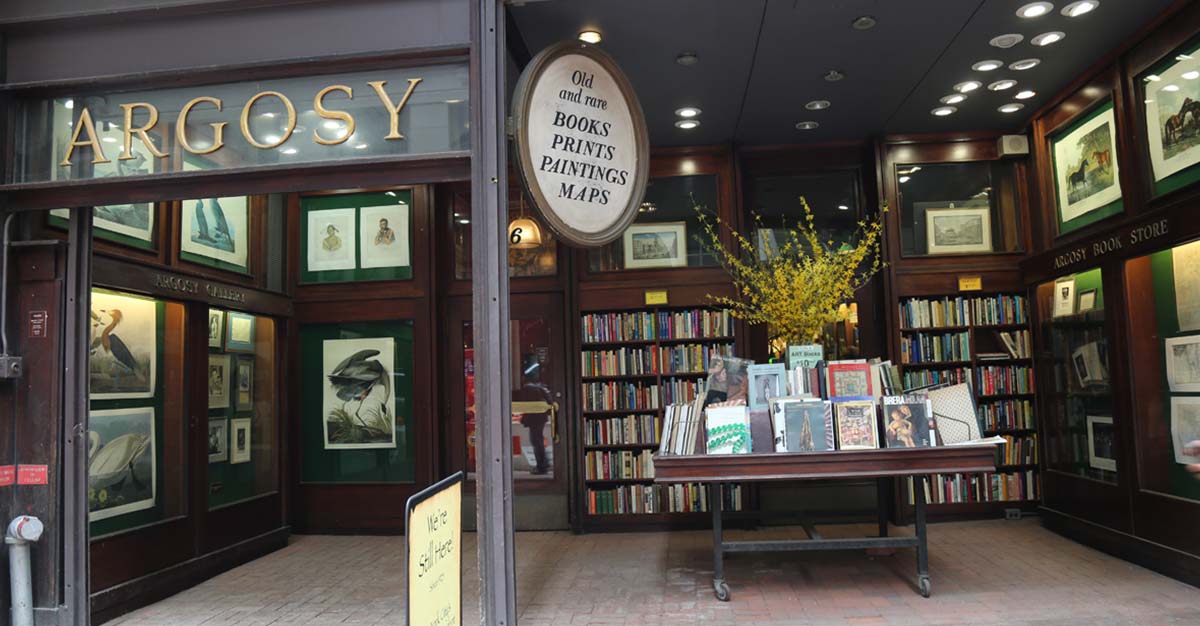Photo Credit—Argosy Bookstore, New York City
The Argosy Book Store on 59th Street in New York reeled me in, not with a siren call but with the only book title that would have drawn me like iron filings to a magnet—Hyman Kaplan by Leonard Q. Ross, exhibited in its window.
I entered an Aladdin’s cave of rare and precious books—a pantheon of the world’s most renowned writers. To me, trawling second-hand bookstores all my life, it was like entering the Louvre to gain access to the Mona Lisa.
Remarkably, there was no sign of dust. No musty smell. The antiseptic wooden bookshelves seemed to have been polished daily. A framed and autographed photo of Ernest Hemingway stood on a stand, presumably for sale.
I grabbed the nearest Kaplan book, anxiously exploring its pages. Yes, it was the edition I had devoured as a boy in Dar-es-Salaam.
A set of short stories depicted a harassed Mr. Parkhill, a New York night school teacher in the 1930s and his class of Eastern European immigrants seeking to improve their rudimentary English. His ‘star’ pupil insisted on displaying his name as H*Y*M*A*N K*A*P*L*A*N in green stars between red letters outlined in blue—an ever-respectful student who contorted the speech and grammar of English into his own perverse logic. Mr.Kaplan’s favourite Shakespearean character was Julius ‘Scissor’. One Christmas, he presented Mr. Parkhill, who was always referred to as Mr., with a gift from his pupils of a briefcase, bearing the initials M.P. It took Mr. Parkhill a while to realize what the ‘M’ stood for.
As a teenager, my summers were spent in Africa visiting my family—a haven from my yearlong schooling in England.
The 1970s were a hotbed of Socialism in Tanzania, governed by an ex-schoolteacher, Julius Nyrere. Ujamaa was introduced as a system of self-sustaining village cooperatives for the economic development of the country.
European governments loved Nyrere, donating billions to his cause, infesting Tanzania with hordes of idealistic aid workers. They would come on three-year contracts, ladened with enough books to last their sojourn, for Dar-es-Salaam had none. On their departure, the books were donated to Khan’s Secondhand Books and Photocopying store, established for a generation beside The Empire Cinema. I became their grateful beneficiary.
The discovery of a brightly chalked cover of ‘Hyman Kaplan’ captivated me as a boy who, at the age of five, had been shipped off to England with no knowledge of the language, to be raised by an English working-class family who knew no other tongue.
Each chapter of the book saw Mr. Kaplan set a torch to the English language, while all the time trying his best to master its inexplicable rules of spelling and pronunciation. Each story saw Mr. Kaplan get the better of Mr. Parkhill as the perplexed teacher tried in vain to explain the arcane intricacies of his subject.
In one sentence Mr. Kaplan wrote on the board for class scrutiny, his fellow learners found a dozen mistakes. Instead of leaving him embarrassed, Mr. Kaplan gazed at his masterpiece in awe at creating such a puzzle for the class to solve.
As a five-year-old, beached upon an island of English kids in a classroom, I had neither the bravado nor the belief to question the puzzling syntax of sentences. Unlike Mr. Kaplan, I could not withstand the perpetual slings and arrows of his classmates. I developed an admiration and affection for the character whose travails I too shared. Besides, the stories were funny.
Summer vacations inevitably drew to an end. I would return the books I had read to Khan’s—save for the dissertations of Mr. Kaplan. These volumes were stored in a hallowed, glass-fronted bookcase until my return or, as it happened, until my family fled their home under political strife, abandoning everything including my precious memorabilia… until they surfaced in Manhattan.
A glutton, I requisitioned all three books in the series, not daring to ask their price, handing over my credit card at arm’s length.


